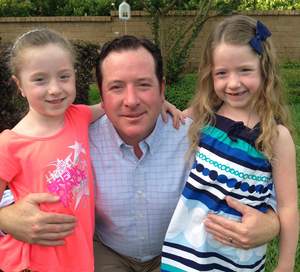JACKSONVILLE, FL--(Marketwired - Jun 2, 2015) - When a couple learns they are expecting a baby, they soon begin to dream about what life will be like when their child arrives, how their lives will change and all the joy he or she will bring. They rarely think about the possibility of their baby being diagnosed with a fetal syndrome, risking the child's and mother's health and possibly the entire pregnancy.
During her second pregnancy, Matt Ray's wife, Krista, learned around 12 weeks that they were having twin daughters. Four weeks later, just as they were becoming adjusted to that happy news, the couple learned that the girls were not equally sharing amniotic fluid, which warranted additional and more frequent monitoring.
Matt said, "We were seen once a week to monitor their vitals and fluid levels. Ultimately, at week 23, we were told that it was time for action. Madeline had too much amniotic fluid and Leslie had virtually no visible fluid in her sac."
The waiting was stressful. The Rays had been told about the possibility of a fetal syndrome like twin-to-twin transfusion syndrome (TTTS) presenting itself, so every week they watched and waited. TTTS is a condition that affects an estimated 30% of identical twins who share a common placenta. In TTTS, the babies receive a disproportional share of blood and nutrients -- one gets too much and the other too little. Without proper intervention TTTS can cause the death of one or both of the babies.
The Rays received the official diagnosis of TTTS at 23 weeks. "I remember the fear and confusion. I was also very worried for and about my wife," said Matt.
Prior to the TTTS diagnosis, the Rays had met with a Tampa-based TTTS specialist, Dr. Ruben Quintero to discuss treatment options and the criteria for each. The Rays did a lot of research on the disease and agreed to be patient while Krista was monitored weekly. They received the final diagnosis on a Friday and immediately tried to schedule a fetal ablation surgery with Dr. Quintero, but he was out of the country. Their next option: travel to Los Angeles to have Dr. Chmait, another fetal surgeon who had trained under Dr. Quintero, perform the much-needed surgery.
Matt said, "We had to wait until the following Tuesday for Dr. Chmait to perform the fetoscopic laser surgery. It was the longest four days of my life, but ultimately, the procedure balanced the fluid distribution, providing Leslie with the nutrients she needed and easing the strain on Madeline's tiny organs."
For the next seven weeks after the treatment, the Rays' time was somewhat normal. However, at week 30, Krista's water broke. She went to the hospital and spent the next four weeks there. While Krista was well cared for by hospital staff, Matt worked when he could, managed the home and took care of their toddler, while also managing to visit with his wife in the hospital.
"Overall, our experience consumed me for many months and I went through a whirlwind of emotions. Ultimately it gave me hope and the realization of the blessings of modern day science and the miracles that are my daughters," said Matt. "Going through this experience, and watching my wife go through it, reconfirmed my love for my wife's independence, self-awareness and her toughness."
The Rays welcomed their TTTS survivors, Madeline and Leslie, on August 30, 2008 at 34 weeks, weighing 4lbs. 13oz. and 5lbs. 2oz. For Matt, every day is Father's Day. "Once you experience that kind of fear and uncertainty, you learn to appreciate every minute you spend with your children," said Matt.
The family has added another annual celebration to their calendar -- The Great Candy Run. Each year, families who have been affected by a fetal syndrome gather to celebrate and honor those lost and those who survived the journey during the annual Great Candy Run 5k. This year's event will take place in downtown Jacksonville on October 10, 2015. Proceeds, which benefit the Fetal Health Foundation, will help to support the research of treating and curing intrauterine fetal syndromes at fetal centers around the United States. To learn more or register for the sweetest race in town, visit www.thegreatcandyrun.com.
About The Great Candy Run
The Great Candy Run is a national race series, featuring a run/walk 5K, along with the Gumdrop Kids' Fun Run and a competitive Stroller Division. The event features on-course entertainment, a costume contest and tons of treats at the sweetest finish ever. All proceeds from the event benefit the Fetal Health Foundation, a national non-profit organization focused on funding research and serving as a liaison between families affected and the medical teams that provide their care. To learn more about the race or its charity beneficiary, visit www.thegreatcandyrun.com or www.fetalhealthfoundation.org.
